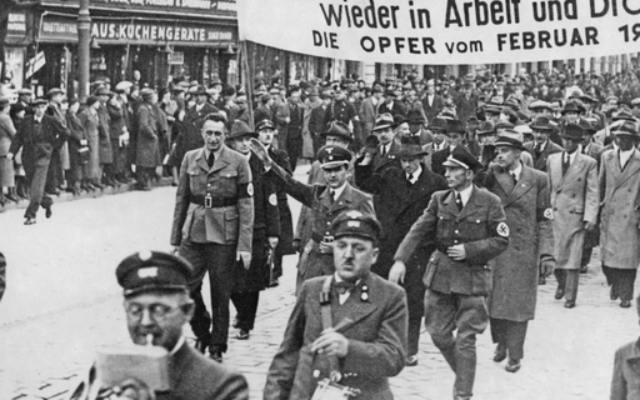Burgenland: Family tale woven with Holocaust horror reveals that Adolf Eichmann rubber-stamped emigration papers of Jews leaving Austria
Barrister David Joseph spent seven years researching his family's history
Jenni Frazer is a freelance journalist
In every Jewish community there are family stories — and gaps in those stories, often when the Holocaust intervenes. And sometimes the family stories bump up against key moments in the Holocaust, so that we can learn — through the apparently mundane moments of family lives and crises — about the almost unfathomable magnitude of years of sustained oppression, antisemitism and genocide.
London barrister David Joseph comes from such a family. In Burgenland, his newly published book, he succeeds in his ambition “to weave the story of a family into the ebb and flow of historic events, the pell-mell of history”. It took Joseph, a KC, seven years to complete this complex tapestry, and there is a sense for the reader that there are some threads still left dangling. But not every question about the Shoah will always have an answer.
Joseph, handsome and leonine in his office, surrounded by files and research documents, brings a forensic legal eye to bear on the fates of his family, who originate from a small village near the Austro-Hungarian border called Lackenbach, in a province called Burgenland. “If you went there, you would have the most beautiful drive from Vienna, through the most idyllic countryside, with gorgeous sunsets, and a lake shimmering in the distance. Think of the Cotswolds on steroids. And then Lackenbach appears from almost nowhere”.
It was the home of “the greatest of all European families, the Esterhazys”. And, says Joseph, by an extraordinary turn of serendipity, this village became “the first in and the first out” when it came to the Holocaust. “Lackenbach was among the first places in Europe where, under the Esterhazys, Jews were granted something which approximated to full civil rights. And you think, well, this is the most amazing story”.
And yet, in March 1938, “when the Nazis rolled in over the border, the Lackenbach Jews were the first to be rounded up in the Holocaust. So they’re the first in, and they’re the first out. And they’re not rounded up by Nazi-helmeted German soldiers. Oh, no. They’re rounded up by the villagers themselves. So you have to think, what went wrong?”
And that is the focus of Burgenland, Joseph’s ambitious attempt to tell the story of the Holocaust through the prism of his family. He says that at the start he knew probably less than 10 per cent about what had really happened to them. All the rest, as Hillel might have said, was research.

In several hundred closely-argued pages, Joseph sweeps the reader along with his research, cheering for him when he makes an unexpected discovery in the never-ending files, becoming disappointed when he reaches a historical dead end. We meet Joseph’s Uncle Max, whom he is able to interview towards the end of his life in an old age home in Israel, and understand the initial frustration when Joseph cannot find his uncle’s diary. Then he learns that — as so often with Holocaust archives — Max’s contemporary account is stored under a different name, so there is understandable triumph when Joseph finally finds it.
At one point there is real visceral horror, when Max is desperately trying to leave Austria and needs seemingly endless bureaucratic documents signing off before he can go. And the last person he has to see, in a long line of faceless clerks and bureaucrats, is Adolf Eichmann.
Who knew that one of the leading architects of the Final Solution did, literally, rubber-stamp the emigration papers of terrified Jews? Joseph brings this appalling scene brilliantly to life as we realise how fearful Max must have been, shaking as he stood in front of Eichmann, worrying about last-minute hitches.
After many hurdles, Max did eventually make it onto a ship bound for Palestine, the Eli, crammed on board with hundreds of other young hopeful Jews. His diary records a service and a sermon on Chaya Sarah — the life of Sarah — which Joseph, with some amusement, admits to having concocted. “I knew the date of the sermon… I took a liberty and was familiar with the kind of themes a rabbi might say about Chaya Sarah”. If the KC ever decides to leave the Bar for the rabbinate, this could be his calling card.
Besides Eichmann — to whom Joseph devotes an entire chapter — we also meet one of the largely unsung chancers and fixers of the Holocaust, in the person of Willy Perl. Perl, a Viennese lawyer whose papers now reside in the US Holocaust Museum in Washington DC, was “chutzpah squared”, according to David Joseph. He did deals with many leading Nazis including Eichmann, commandeering ships to take groups of Austrian Jews out of the country. All too often Perl’s ship deals fell through and he was forced to find alternative, and usually more expensive, solutions.
David Joseph reckons that Perl was “an incredible character. He must have saved at least 10,000 people. He’d say whatever was necessary to get the job done”. Even further in the shadows is another fixer called Berthold Storfer, whose negotiations on behalf of Jews eventually landed him in Auschwitz. Storfer, born Jewish, had been baptised as a child and was able to negotiate as a Christian with the Nazis, but in the end this did not save him.
The lawyer admits that he did not know how Burgenland was going to conclude. But he records, in as much detail as he can, the fate of most members of his family, painful as this often was. He describes the book as fundamentally “a Zionist tale” — a triumph of hope over seemingly impossible odds.
Burgenland, by David Joseph, is published by Amberley Books on May 15 at £25. David Joseph will be in conversation with Sam Wordsworth KC at JW3 on Sunday 14 May and with Rabbi Shlomo Levin at South Hampstead Synagogue on Sunday 21 May.

Thank you for helping to make Jewish News the leading source of news and opinion for the UK Jewish community. Today we're asking for your invaluable help to continue putting our community first in everything we do.
For as little as £5 a month you can help sustain the vital work we do in celebrating and standing up for Jewish life in Britain.
Jewish News holds our community together and keeps us connected. Like a synagogue, it’s where people turn to feel part of something bigger. It also proudly shows the rest of Britain the vibrancy and rich culture of modern Jewish life.
You can make a quick and easy one-off or monthly contribution of £5, £10, £20 or any other sum you’re comfortable with.
100% of your donation will help us continue celebrating our community, in all its dynamic diversity...
Engaging
Being a community platform means so much more than producing a newspaper and website. One of our proudest roles is media partnering with our invaluable charities to amplify the outstanding work they do to help us all.
Celebrating
There’s no shortage of oys in the world but Jewish News takes every opportunity to celebrate the joys too, through projects like Night of Heroes, 40 Under 40 and other compelling countdowns that make the community kvell with pride.
Pioneering
In the first collaboration between media outlets from different faiths, Jewish News worked with British Muslim TV and Church Times to produce a list of young activists leading the way on interfaith understanding.
Campaigning
Royal Mail issued a stamp honouring Holocaust hero Sir Nicholas Winton after a Jewish News campaign attracted more than 100,000 backers. Jewish Newsalso produces special editions of the paper highlighting pressing issues including mental health and Holocaust remembrance.
Easy access
In an age when news is readily accessible, Jewish News provides high-quality content free online and offline, removing any financial barriers to connecting people.
Voice of our community to wider society
The Jewish News team regularly appears on TV, radio and on the pages of the national press to comment on stories about the Jewish community. Easy access to the paper on the streets of London also means Jewish News provides an invaluable window into the community for the country at large.
We hope you agree all this is worth preserving.






















